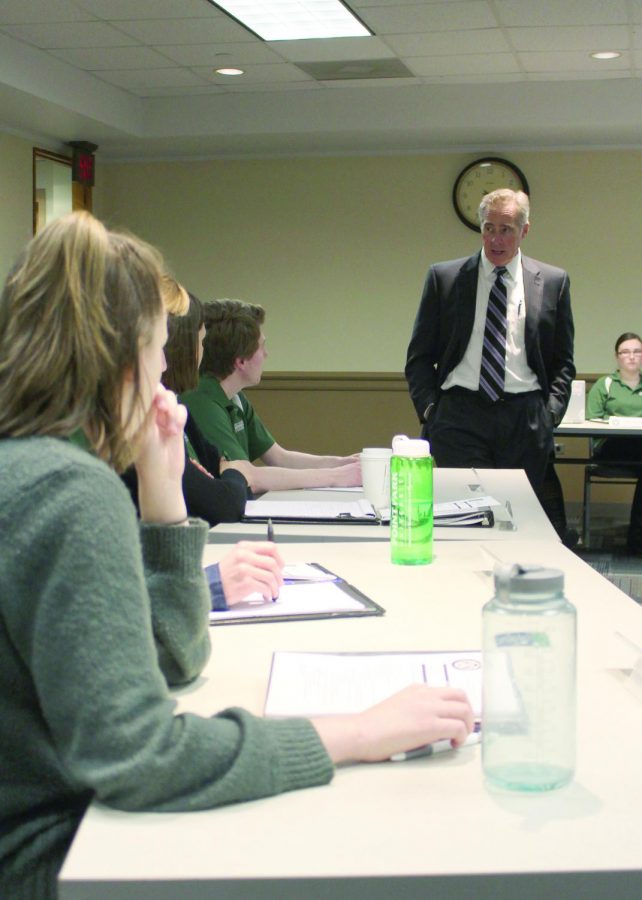Hennigan addresses housing and tuition
Influx of new members, club concerns also discussed
Photo by Robert Berger
President Hennigan addressed USG and student concerns regarding tuition and housing at their meeting on Monday.
January 15, 2019
University President Paul Hennigan visited the second United Student Government (USG) meeting of the Spring 2019 semester to discuss how Point Park will adjust its tuition pricing structure.
Hennigan detailed how the faculty have been studying ways to form comprehensible and fair tuition pricing structures for prospective and currently enrolled students. He presented the idea of using student focus groups to USG.
The focus groups will be comprised of 10 students that are geographically, ethnically and educationally diverse in order to gauge a reaction from a range of different perspectives across campus. Hennigan stated that the aim of these focus groups is to provide data on how well students can understand current and possible future models of tuition pricing by having them choose which model is the most comprehensible.
While most of the details on the focus groups remain confidential (three unnamed researchers will compile the data, an unnamed Point Park alum will lead the study and the results will not be publicized), Hennigan offered USG the ability to organize their own focus group of 10 heterogenous students. The responsibility of choosing students for the group was passed onto the USG’s Student Concerns Committee at the end of the meeting.
Hennigan also discussed Point Park’s lack of current plans to purchase more property, even housing. However, he commented that more “decent” private housing providers have offered student housing this year than he has usually seen.
Hennigan then expressed his concern for students being able to find decent housing, citing incidents where students that lived at private housing in Oakland were not required to keep their housing up to code. The students would supposedly neglect the maintenance of the apartments and lead to unsafe living conditions or lack of working appliances.
Hennigan plans to return to the USG meeting on March 4, to discuss more issues and concerns addressed by students.
With the application deadline for USG Senators ending Friday, Jan. 18, Senator Jacob Berlin later claimed that the influx of newly applied members will only temporarily fill Senate seats, further fueling a “revolving door” of new and leaving senators. Berlin also questioned the initiative of new members that could treat USG “like a club you would get into for a few weeks and then just leave.”
Treasurer Kortney Lampel and Senator Megan Ortego refuted the claims, stating that new senators are taken only to host an array of perspectives from different schools across campus and that the recent bout of resignations allowed for a greater number of seats to be filled.
The rest of the meeting touched on various ways that USG will give attention to more concerns held by students by finding methods of advertising USG’s usefulness.
The Student Concerns Committee plans to send officers to other student club meetings to probe for issues, questions and needs that the average student would generate.
Members of the Communications Committee have drafted posts for social media outlets like Twitter and Instagram to help advertise the new open senate positions and the use of USG as more of a resource for students than just an internal organization on campus. They also plan to advertise the weekly legislative body meetings through spots on WPPJ to invite more students to ask questions and state concerns during open floor sessions.
The meeting came to an odd discovery that the ideas for the next Pioneer Community Day Committee meeting on Friday, Jan. 18, will be basing their plans off of the ideas previously used in the 2014 Pioneer Community Day, which raised some confusion.
Advisor Rachel Phillips explained that the binders of more recent years were taken by the previous chair and were never returned, leaving the committee members to work with the 2014 idea binder. Senator Dennis McDermott suggested entering future idea binders and related USG documents into an online archive-like system to ensure their safety, malleability and security.


















